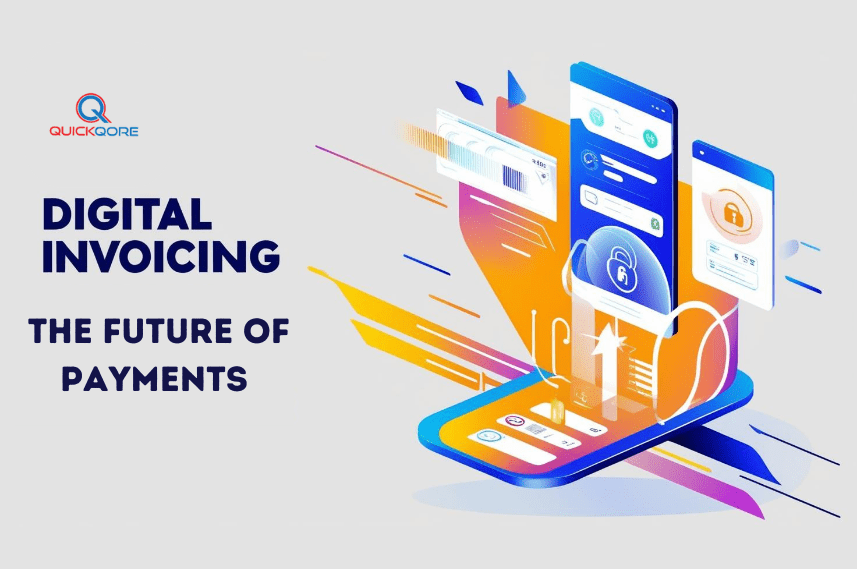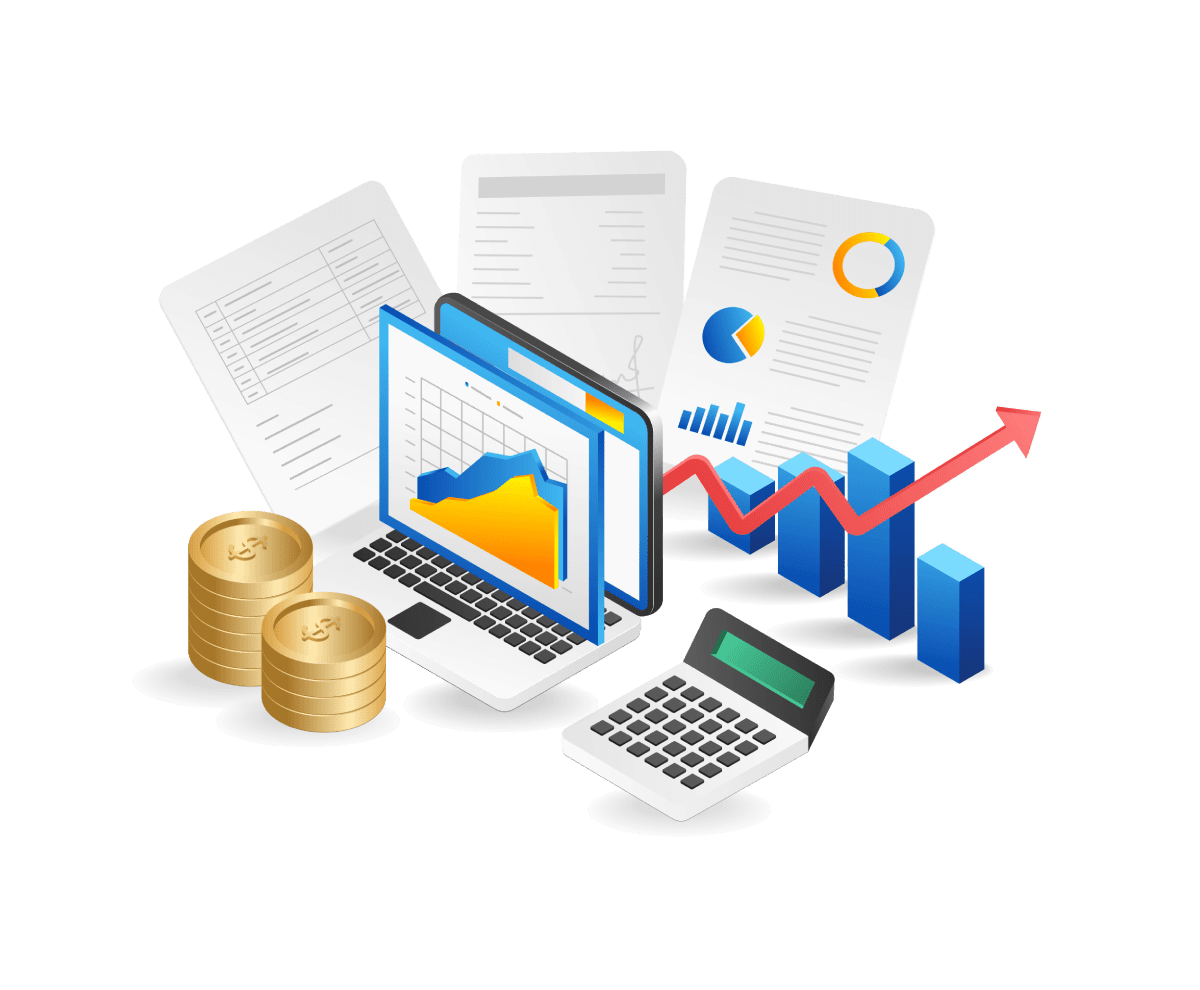Digital Invoicing | Tips and Trends for Efficient Billing
In today’s fast-paced digital economy, businesses are constantly seeking ways to improve efficiency, reduce costs, and enhance customer experiences. One of the most transformative advancements in financial transactions is digital invoicing. Digital invoicing, often integrated with business accounting software, makes accounting data more accessible and secure, ensuring that financial information is both portable and protected. Traditional paper-based invoicing is becoming obsolete as organizations worldwide embrace digital solutions that streamline operations and improve cash flow. Additionally, digital invoicing allows accountant access to clients’ financial data directly, enhancing collaboration and efficiency. In this blog, we explore why digital invoicing is the future of payments and how businesses can leverage it for sustainable growth.
Introduction to Digital Invoicing
Digital invoicing is a crucial aspect of accounting software, allowing small businesses to create, send, and manage invoices with ease. With the best accounting software, businesses can automate invoicing processes, reducing manual tasks and minimizing errors. Online invoicing also enables businesses to accept payments online, improving cash flow and reducing the need for paper-based invoices. By utilizing cloud accounting software, small businesses can access their invoicing data from anywhere, at any time, and make informed business decisions. This flexibility ensures that business owners can manage invoices and monitor their financial health even when they are on the go. Mobile apps further enhance this flexibility by allowing users to send invoices on the go, track time and miles, and capture images of receipts directly from their iOS or Android devices.
What is Digital Invoicing?
Digital invoicing, also known as electronic invoicing (e-invoicing), is the process of generating, sending, receiving, and managing invoices electronically. Unlike traditional paper invoices, digital invoices are created and processed through software applications, allowing businesses to create invoices that cater to the language preferences of customers, enhancing effective communication and improving the overall customer experience. Digital invoicing integrates with online accounting software to streamline financial processes, providing a centralized platform for managing financial data securely and efficiently.
With digital invoicing, businesses can automate billing cycles, integrate with accounting systems, and reduce manual intervention, thereby minimizing errors and ensuring compliance with financial regulations. Additionally, digital invoicing can automate tasks such as invoicing and reporting, reducing manual intervention and enhancing efficiency for small businesses.
Why Digital Invoicing is the Future
1. Enhanced Efficiency & Automation
Digital invoicing eliminates manual data entry, reducing human errors and administrative workload by allowing businesses to automate tasks like invoicing and reporting. Using double entry accounting software further reduces human errors by automating the entry of debits and credits, facilitating the quick generation of essential financial reports. Automated invoicing systems can generate invoices, send reminders, track payments, and even handle recurring billing without human intervention. Advanced tools in digital invoicing platforms can further enhance productivity by offering customizable dashboards, workflow automations, and integration with other applications. This level of automation speeds up the entire invoicing process and improves overall productivity.
2. Faster Payments, Automatic Payment Reminders & Improved Cash Flow
One of the biggest challenges businesses face is delayed payments. Digital invoices enable real-time transmission and can be integrated with payment gateways, allowing customers to pay instantly through multiple payment modes such as credit cards, bank transfers, UPI, and digital wallets. Additionally, digital invoicing helps in tracking and managing outstanding invoices, ensuring better financial oversight. Faster payments ensure healthier cash flow and financial stability for businesses. Digital invoicing also allows businesses to send invoices quickly and efficiently, streamlining administrative tasks and improving overall productivity by managing cash flow effectively.
3. Cost Savings & Eco-Friendly
Paper invoices involve printing, mailing, and storage costs, all of which add to operational expenses. Free accounting software can help small businesses save costs by providing basic income and expense tracking without the need for expensive tools. Additionally, many digital invoicing solutions offer a free version that allows small businesses to perform essential tasks such as tracking income and expenses, sending unlimited invoices, and accessing financial reports without incurring any costs. Digital invoicing eliminates these costs, making it a more cost-effective solution. Some digital invoicing solutions offer the ability to send unlimited invoices, reducing operational costs further. Additionally, reducing paper usage contributes to environmental sustainability, supporting businesses in their corporate social responsibility (CSR) initiatives.
4. Increased Accuracy & Compliance
Manual invoicing often leads to errors, such as incorrect amounts, duplicate invoices, or lost documents. Digital invoicing minimizes these risks by ensuring accurate data entry, providing audit trails to ensure transparency and accountability, automated tax calculations, and structured compliance with government regulations. Additionally, users can generate a balance sheet to monitor the financial status of their businesses effectively. Digital invoicing systems can automatically calculate and include sales tax, ensuring compliance with tax regulations. In many countries, digital invoicing is already mandated to enhance tax reporting and transparency.
5. Enhanced Security & Fraud Prevention
Paper invoices can be misplaced or tampered with, making them vulnerable to fraud. Digital invoicing systems, as part of a secure accounting platform, offer robust security features such as encryption, digital signatures, and blockchain-based authentication. These technologies prevent unauthorized access, reduce the risk of invoice fraud, and ensure secure transactions. Additionally, digital invoicing systems can be part of an integrated platform that enhances security and efficiency by seamlessly managing various business operations, including tracking bank account balances and performing bank reconciliations.
6. Seamless Integration with Cloud Accounting Software
Digital invoicing platforms can be integrated with accounting software, ERP (Enterprise Resource Planning) systems, CRM (Customer Relationship Management) tools, and bank accounts for seamless financial management. The integration of various accounting tools, such as income and expense tracking, automatic transaction matching, and invoicing capabilities, enhances financial management for different business types and sizes. This seamless connectivity ensures that invoice data is automatically updated in financial records, reducing discrepancies and enhancing financial reporting. Additionally, digital invoicing systems can automatically reconcile bank transactions, reducing discrepancies and providing accurate cash flow visibility.
7. Global Reach & Scalability
For businesses operating in multiple locations, digital invoicing systems can support multiple users, enabling better collaboration across teams. These solutions are scalable for businesses with varying annual revenue, making them accessible for startups and smaller firms as well as larger enterprises. Many digital invoicing solutions support multi-currency, multi-language, and international tax compliance features, making them ideal for global businesses looking to scale efficiently. As the business grows, these systems can adapt by allowing upgrades or changes in subscription plans, ensuring continued efficiency.
Accounting Software for Small Businesses
Accounting software for small businesses is designed to help manage financial transactions, track income and expenses, and provide insights into a business’s financial health. The right accounting software can help small businesses streamline their financial processes, reduce errors, and make informed decisions. With features such as automatic payment reminders, online payments, and recurring invoices, accounting software can help small businesses manage their finances efficiently. Additionally, cloud accounting software provides secure and accessible storage of financial data, allowing businesses to access their information from anywhere with an internet connection. This ensures that small business owners can stay on top of their finances and maintain a clear picture of their financial status at all times.
Key Features of Accounting Software
When selecting accounting software, small businesses should look for key features such as double-entry accounting, invoicing, expense tracking, and financial reports. The best accounting software should also provide advanced features such as inventory management, tax compliance, and automated tasks. Furthermore, accounting software should be able to integrate with third-party apps, allowing businesses to seamlessly connect their financial data with other business tools. By considering these key features, small businesses can find the right accounting software to meet their needs and improve their financial management. This comprehensive approach ensures that all aspects of a business’s financial operations are covered, leading to more accurate and efficient financial management.
Benefits of Cloud Accounting Software
Cloud accounting software offers numerous benefits for small businesses, including improved cash flow, increased efficiency, and enhanced security. It also allows businesses to generate a cash flow statement for improved financial management. With cloud accounting, businesses can access their financial data from anywhere, at any time, and make informed decisions. Cloud accounting software also provides automatic backups, reducing the risk of data loss and ensuring that financial information is always up-to-date. Additionally, cloud accounting software can help small businesses reduce manual tasks, minimize errors, and improve their overall financial management. By utilizing cloud accounting software, small businesses can focus on growth and development, rather than manual accounting tasks. This shift allows business owners to dedicate more time to strategic planning and business expansion.
Efficient Billing and Payment Processing
Financial Management and Reporting
Financial management and reporting are critical components of accounting software, providing small businesses with insights into their financial health by generating reports. With the right accounting software, businesses can generate profit and loss statements, balance sheets, and cash flow statements, helping them make informed decisions. Accounting software should also provide customizable reporting, allowing businesses to create reports tailored to their specific needs. Furthermore, accounting software should be able to track income and expenses, providing businesses with a clear understanding of their financial position. By utilizing accounting software with advanced financial management and reporting features, small businesses can improve their financial health and make informed decisions to drive growth and success. This comprehensive financial oversight is essential for maintaining a healthy and sustainable business.
Streamlining Financial Operations
Streamlining financial operations is essential for small businesses to stay competitive and achieve their goals. Accounting software can play a vital role in this process by automating tasks, providing real-time financial data, and offering advanced features like inventory management, tax compliance, and financial reporting. With cloud accounting software, businesses can access their financial data from anywhere, at any time, using a secure internet connection. This enables small business owners to make informed decisions, manage their cash flow effectively, and ensure compliance with tax regulations. By choosing the right accounting software, small businesses can streamline their financial operations, reduce manual tasks, and focus on growth and development. Key features to consider include customizable reporting, automated expense tracking, and seamless integration with third-party apps.
How Businesses Can Implement Digital Invoicing
Transitioning to digital invoicing requires strategic planning. Here’s how businesses can implement it effectively:
Choose the Right Invoicing Software: Opt for a cloud-based, secure, and scalable invoicing solution that aligns with your business needs.
Integrate with Payment Gateways: Ensure your invoicing system is linked with online payment options for faster transactions.
Automate Recurring Invoices: If your business operates on a subscription or service model, automation will save time and ensure timely payments.
Schedule Payments: Set up schedule payments to ensure timely transactions, prevent late fees, and enhance cash flow management.
Ensure Compliance: Stay updated with regulatory requirements in your country to avoid legal complications.
Train Employees & Customers: Educate your team and clients on the benefits and usage of digital invoicing to encourage adoption.
Implement a Customer Portal: Enhance customer experience by providing a centralized platform for managing transactions through a customer portal.
Create Professional Invoices: Generating professional invoices is crucial for enhancing customer experience. Use intuitive invoicing software to create high-quality invoices easily, even without a finance background.
Final Thoughts
Digital invoicing is not just a trend; it is the future of payments. QuickBooks Online is a popular digital invoicing solution that offers versatility and productivity enhancements. By automating invoicing, businesses can get paid faster, improving cash flow. Businesses that embrace this technology will benefit from streamlined financial processes, improved efficiency, and enhanced security. Digital invoicing also simplifies financial management during tax season, reducing stress and ensuring compliance. As industries continue to shift toward digital transformation, adopting digital invoicing will be a critical step for companies aiming to stay competitive in the modern marketplace.
With QuickQore, businesses can seamlessly transition to digital invoicing, ensuring smooth, secure, and automated transactions. Go digital with QuickQore—get digital invoices today!

